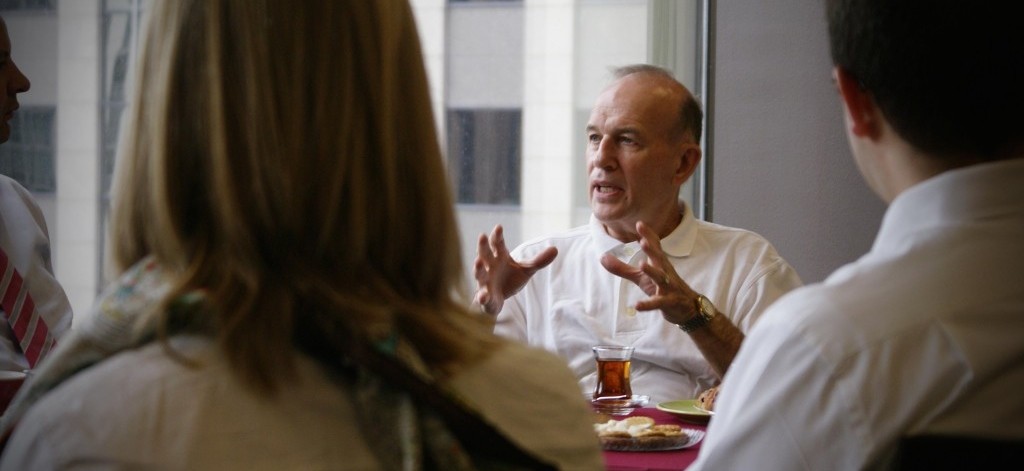By Brendan Dowd
“The stranger does not come accidentally; [s]he brings a particular gift and illumination,” writes poet and philosopher John O’Donohue. Relationships are mysterious. But therein lies their beauty—and power.
Over the years, Niagara Foundation has been blessed with many beautiful circles of friends. Former strangers are now cherished companions. The new Friends in Faith program works to deepen new and already existing relationships between Niagara Foundation staff and prominent religious leaders in the Chicago-land area. Through regular and informal discussions on topics of social, religious, and cultural significance, Niagara hopes to acquire wisdom for furthering its mission of fostering dialogue, cooperation, and fellowship in the community.
I guided our visitor down the corridor which branches off into individual offices before spilling into our large conference area overlooking a horizon of concrete and freshwater. The table of pastries I prepared only minutes before now felt cold in comparison to the positions we took standing with gazes eastward watching the spring storm clouds slowly tumble in. “I hope it doesn’t rain, I didn’t bring an umbrella.” He noted. “Yup,” I insightfully replied.
I admit it, weather was the first channel of conversation we followed, but you know what? I’m one of the few that believes talking about the weather is actually a ‘genuine’ topic of discussion. It’s safe, comfortable, and common. Given the context of this visit, admiration of creation, in all its diversity and power, seemed appropriate.
Fr. Ed Foley, OFM teaches as a professor of theology and liturgy at the Catholic Theological Union in Chicago. In addition to this post and as guest presider at the vibrant Roman Catholic parish of Old St. Pats Cathedral in Chicago, Foley is a highly respected and sought after lecturer and speaker. Currently on sabbatical, Foley has been focusing his time and energy in writing a book exploring Christian theological reflection in religiously and socially pluralistic contexts. We were honored that he took time away from his research to participate as the first guest in this new initiative.
After the tea was passed, the group fell into a conversation about the declining numbers of Americans claiming affiliation with institutionalized religion in comparison to rising numbers of those self-identifying as “spiritual”. “I don’t believe in binaries,” Foley countered. “Perhaps we’re misreading the signs? Perhaps belief is not growing laterally like a tree but horizontally like ginger, like a rhizome, growing and spreading underground.”
A discussion into the challenges individuals, organizations, and communities face as proponents of interreligious dialogue proved to be another fruitful exchange. Foley highlighted the necessity of including humanist and atheist voices into the forums of interreligious dialogue programming.
The language we use in this work may inadvertently exclude important voices from the community. I couldn’t help but pick-up the nuances of W.C. Smith and his criticism of words like ‘religion’ when Foley pointed to the many layers of meaning the word had acquired over the centuries. He theorized that it’s problematic to use as a categorical universal in light of our 21st century context. Perhaps words like ‘faith’ or ‘belief’ would be more fitting? Questions into the existence of a universal language, the role of empathy in dialogical discourse, and how one identifies mutuality, peppered this abnormally profound late afternoon office conversation. I thank the tea…
Always Rethink. That’s what I felt we needed to do as I stood-up, head buzzing from a session of cerebral cross-training. I was reminded that it often takes the perspective of a friend to illuminate new possibilities. Moreover, it takes the softness of a friend to illuminate well-intended but misguided intentions. How do I measure success in my work? Is it always as visible as tree; or is it more inconspicuous like the rhizome?
1. See John O’Donohue’s Anam Cara. (Harper Collins, 1998).
2. See Wilfred Cantwell Smith’s The Meaning and End of Religion (Harper and Row, 1978).
__________________
Brendan Dowd is currently the director of Niagara’s Center for Cultural Exchange and Interfaith Collaboration. Follow him @BDowd_Niagara


